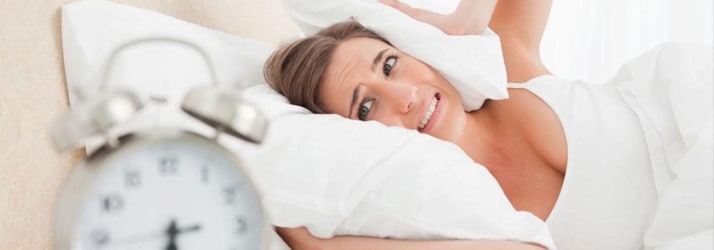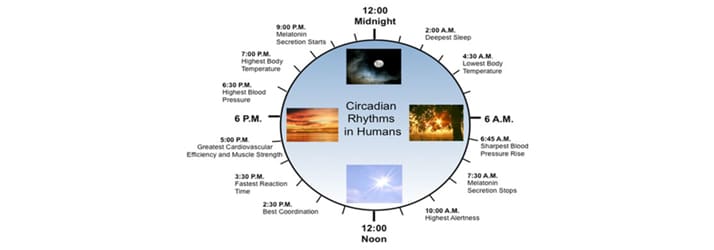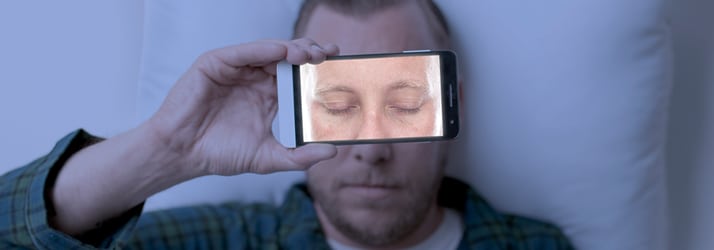Don’t Wait For A Harsh Wakeup Call to Make Changes in Your Sleep Habits
Don't Wait For A Harsh Wakeup Call to Make Changes in Your Sleep Habits

Last Friday night I had a great evening hanging out with a friend and stopped at my office on the way home to pick up some things so I could work from home over the weekend. I had set aside time on Saturday to work on this blog and prep for some of my upcoming workshops.
While at the office, I decided to just take care of a few loose ends and the next thing I knew, it was after midnight. Once I got home, again, just a little bit of puttering before bed and I was finally lying down around 1:30 AM, still figuring I could sleep in until 9:30 AM and then get up and get to work on my project uninterrupted.
Around 6:30 AM I heard the rain falling against the open window and bolted up remembering the clothes on the line outside, dashed down and brought them in and tried going back to sleep. It took a little while. At 8:30 AM, the phone woke me with a call from my daughter from Europe. I darted to the phone.
After that, well, might as well stay up now and get to work on my projects. Only problem was my mind was foggy and not ready to work. I sluggishly drifted through the rest of the day very unproductively distracted by all the things that I might do, including considering a nap, waiting for my brain to be focused enough for my project.
It never happened and I ended up going to bed early and used the next day’s recreational time to get my work done.
There you go! Yes, sleep is my Achilles heel as well. And I know better!
This happens rarely now in my life because years ago, I had a WAKEUP call.
A practice member of mine, who was also my midwife, and who it appeared had a very healthy lifestyle, told me she had cancer. After a prolonged battle, she passed away, but before she did, I remember a powerful conversation I had with her, where I asked her why she thought this had happened to her, when she had been under chiropractic care, meditating, exercising, and eating a very clean and healthy diet most of her life.
She told me that she believed that her interrupted sleep, due to her duties as a midwife, was a strong contributing factor. It was then that I started researching more about how sleep affects our health.
I realized that I had to change some of my own sleep habits and I knew that the most effective way for me to change a habit in myself, was to dive deep and understand it. Only then, would I be able to change my beliefs (that I could ‘get away with’ poor sleep habits) so I could level up my lifestyle to incorporate a healthier rhythm for myself.
What is the take-away here? There's getting sleep at night and then there's getting QUALITY sleep at night. Just because your eyes are closed doesn't mean your body is resting well enough to get what it needs to repair itself from the damage and wear-and-tear of the day.
According to the U.S. Centers for Disease Control (CDC), approximately one in three Americans don't get enough sleep. That qualifies as a public health epidemic!
All living organisms are designed to sleep, because of its restorative and healing effects on our bodies and mind. The sun is the trigger for the vast majority of animals. Except for nocturnal species, when the sun went down, YOU went down, you went to bed. It wasn’t the beginning of the SECOND half of the day!
Before the lightbulb, we as humans would sleep about 9 hrs on average, more in the winter, less in the summer. Once we got the lightbulb, our sleep went down to 8 hrs. Now with screens, it has dropped to 6-7 hrs.
No aspect of our health is untouched by sleep deprivation.
Studies have shown that dozens of serious health problems stem from insufficient sleep. Here are just some of the ways chronic sleep deprivation can harm your health:
- Heart Attack or Stroke. Sleep is when we reboot our responses to the built up stresses of the day. Without this reset, this prolonged fight-or-flight response leads to increases in blood pressure and heart rate, risk factors for heart disease and stroke.
- Weight Gain. Insufficient sleep interferes with the hormones of the body that signal fullness (leptin) and hunger (ghrelin), leading us to pack on pounds.
- High Blood Sugar. Short sleep can negatively affect how cells respond to insulin, in turn leading to prediabetic hyperglycemia, or high blood sugar. Insulin sensitivity rights itself with proper sleep.
- Arthritis. Not only does joint pain cause sleep loss, but sleep deprivation makes joint pain worse, and can even accelerate joint damage. Exhaustion-related distress causes the immune system to ‘go into overdrive’ flooding the body with inflammatory cells. And while loss of sleep may release damaging inflammatory chemicals, it also means the joints miss out on the healing benefits of sleep. Inflammation suppresses human growth hormone, speeding the decline of tissue and bone. Even one bad night’s sleep can set this in motion.
- Immune System. Sleeping less than six hours a night makes you more than four times more likely to catch a cold.
- Cancer. Even a single night of four or five hours’ sleep can cause a drop in the body’s cancer-fighting cells.
- Neurocognitive Functioning. Alertness, memory, concentration, reaction-time and decision-making are all impaired with sleep deprivation. Lack of sleep impairs your brain’s speed and higher-level processing. You may find yourself reading the same sentence over and over, having delayed reaction times while driving or struggling to make decisions or solve problems. Needless to say, this can lead to serious consequences at work, at home and on the road.
- Neurodegenerative disease. When we sleep, our brain cells shrink, creating space around them for the cerebrospinal fluid to wash through and clear toxins. A backup of toxins increases inflammation and is associated with both brain fog and plaquing found in Alzheimers. Moreover, as these plaques accumulate, they limit the brain’s ability to sustain sleep, leading to a vicious cycle.
- Poor Mental Health. Cortisol, the action and stress hormone drops with good sleep. Depression, anxiety and mood swings are just a few of the mental side effects of reduced sleep. In adolescents, sleep deprivation is linked to bullying and aggression.
- Clumsiness. If you’re regularly tripping over your own feet or bumping into things, lack of sleep may be to blame. Difficulty with movement stems from slowed reaction and lack of concentration, making normally easy tasks like walking upstairs suddenly challenging.
- Vision. Muscles of the eye that control focus and alignment get run down without proper rest. As a result, you may also have more headaches due to strained vision.
- Early Mortality. In general, improper sleep is associated with higher risks of death from any cause.
When you consider the many ways in which sleep deprivation can harm your health, it’s not hard to see how sleep is about more than feeling alert.
Why do we need sleep; what actually happens when we sleep?

In today’s busy world we tend to view sleep as a luxury, making it one of the most overlooked aspects of health. So many vital processes occur when we are asleep: healing, recovering from the effects of stress, resetting our metabolism, rebooting our hormones and many others.
Sleep is complex. It is when the brain goes to the “gym”; Proper sleep architecture is like the most complex gym work out in the world! We go through five stages every 90 minutes and then have 5-6 cycles per night. Isn’t it interesting that our physical bodies just require 30 minutes to 1 hour of physical activity per day but our brain requires 7-8 hours in the “gym” per day? Around 15 to 25 per cent of it should be deep sleep — this equates to around 1½ to two hours every night. During this time, energy levels are restored and the immune system strengthened. Besides vigorous exercise, deep sleep is one of the optimum times for rebooting our hormones to healthy normal after the demands of the day.
Our hormones work together synergistically in a grand cascade each affecting the actions of the others. During deep sleep, along with insulin and cortisol resetting, human growth hormone (HGH) floods the system. HGH is sometimes called the ‘master hormone’ because it is vital to so many processes in the body including tissue repair, growth, recovery from exercise, weight management and continuing replacement of bone and collagen. It is produced in small surges during the day, but by far the biggest burst comes 60 to 90 minutes after falling asleep as we enter deep sleep during a stage known as slow wave sleep.
Levels of melatonin, the key hormone in regulating our daily body cycle or circadian rhythm, are also disturbed by sleep loss, and this in turn upsets the balance of two other hormones. The first is ghrelin, known as the ‘hunger hormone’. Elevated levels of ghrelin at night can prompt people to raid the kitchen, craving carbohydrates in particular. It also causes extra insulin production, making the body store more fat.
The second is leptin, which usually helps regulate appetite, but may be disrupted by loss of sleep. Studies in mice also suggest that leptin may itself have inflammatory effects.
Sleep is the longest time during which the body has low levels of inflammation and the best opportunity to heal.
Learning nEeds a great night sleep in order to move through four of the phases of sleep, packaging and recording memories of the day for future access.
But it can take up to 45 minutes of sleeping to enter deep sleep — and these deep phases seem to occur only in the first half of the night. This means that if someone is tossing and turning they may have very little deep sleep.
What are the most significant factors that affect our sleep?

The most common cause of sleep deprivation is VOLUNTARY behavior. We just stay up too late! Other factors are work schedules, ever-increasing work hours, the blurring of the division between work and home time, study commitments, a poor sleep environment, and bad sleep habits, including the use of lighted electronic devices at night.
Screens: We spend hours each day bathed in technology's blue light.
As you react to incoming texts and emails, scroll through Facebook and Instagram, play games or watch videos, your brain activates with racing neurons and increased production of cortisol - a stress hormone that creates a result very similar to anxiety.
This may not be that big of a deal during the daytime, but at night it can keep your brain in an alert, vigilant state. How deep would your sleep be if you thought there was a tiger lurking around you?
Exposure to bright light from our devices at bedtime also throws off our internal clock by suppressing melatonin and thus keeping us awake.
The type of light our devices emit plays a major role. "Blue light," affects melatonin production more than any other light, including harsh fluorescent and LED lights.
Device usage before bed has been linked to more difficulty falling asleep and less restful sleep.
AMOUNTS
Not getting enough sleep isn’t just about dark under-eye circles or embarrassing yawns during meetings. As we have discussed, the consequences of insufficient sleep can have a serious, widespread toll on your health, in ways most folks may not even realize.
When talking about insufficient sleep, it’s important to know just what “insufficient” means. According to the National Sleep Foundation, here’s the breakdown of sleep time recommendations for teens and adults:
- Teenagers (14–17 years): 8–10 hours, but 7–11 may be appropriate
- Adults (18–64 years): 7–9 hours, but 6–10 may be appropriate
- Older adults (over 65 years): 7–8 hours, but 5–6 hours or up to 9 hours may be appropriate
Nightly hours of sleep below these minimums begin to fall into the dangerous zone of insufficient sleep. The consequences to your health increase the lower that number falls. Catching up on the weekends may not cut it.
You cannot erase sleep debt with one good night of rest!
TIPS FOR A BETTER NIGHT’S SLEEP IN SHELBURNE

If the signs point to not enough rest, your sleep habits may need a little tweaking. Try these expert-tested tips to fall asleep and stay asleep.
Sleep on a schedule. Try to go to bed and wake up at the same time every day, including weekends. A sleep schedule helps regulate the body's sleep-wake cycle and can help sleep come more naturally. Close your eyes by 10 pm so you are entering deep sleep by 11 pm. Most healing will occur between the hours of 11pm and 1 am. Rising within an hour of sunrise will help tune in to the proper circadian rhythm.
Create a relaxing sleep environment. Take a look around your bedroom: is it an inviting, soothing place to sleep? Block obtrusive light with blackout curtains and buffer noises with a fan, white noise machine or earplugs. Set the temperature between 60 and 67 degrees. Make sure your pillows and mattress are comfortable and supportive (mattresses should generally be replaced every nine or 10 years).
Power down. Putting your device away at least an hour before bed gives your eyes, and your brain, a rest.
Exercise daily. Doctors recommend vigorous daily exercise for most people, but even light physical activity can help prepare your body for sleep.
Avoid naps. If you already have trouble falling or staying asleep at night, daytime catnaps might make problems worse. Limiting Daytime Naps to 30 Minutes and make sure they are not after 4 pm
Wind down & relax. A relaxing bedtime ritual can help set the stage for sleep. Try low-energy activities like reading, meditation, stretching or light yoga.
Avoid heavy meals at night. Large or spicy meals, as well as caffeine, nicotine and alcohol, can disrupt sleep. Avoid eating large meals two to three hours before bed, and avoid alcohol and caffeine after lunch. If you're still hungry, have a light snack 45 minutes before bed.
Ensuring Adequate Exposure to Natural Light. Increased exposure to light during the day may also help get your body’s circadian clock back in sync. Using lamps rather than ceiling lights in the evening and blue light blocking glasses after 8 pm can help restore proper melatonin production.
Apply these tips so you get the rest you need to live your happiest and healthiest life!
Sleep like your life depends on it… because it does!
OFFICE HOURS
Monday
2:00pm - 6:00pm
Tuesday
7:00am - 12:20pm
Wednesday
2:00pm - 6:00pm
Thursday
7:00am - 12:30pm
3:00pm - 6:00pm
Friday
Closed
Saturday
Closed
Wellspring Chiropractic Lifestyle Center
4076 Shelburne Road #5
Shelburne, VT 05482
(802) 985-9850


